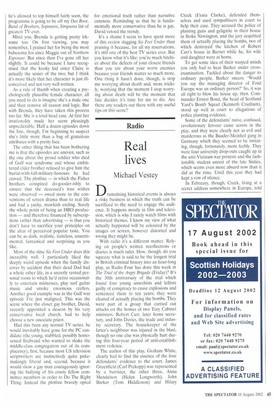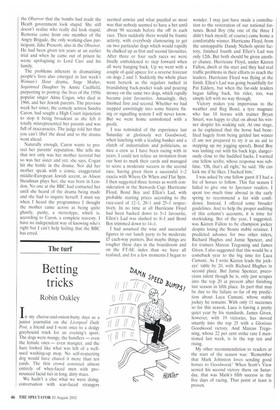Radio
Real lives
Michael Vestey
Dramatising historical events is always a risky business in which the truth can be sacrificed to the need to engage the audience. It happens mostly in film and television, which is why I rarely watch films with historical themes. I know my view of what actually happened will be coloured by the images on screen, however distorted and wrong they might be.
With radio it's a different matter. Relying on people's written recollections or diaries is much safer. How, though, do you squeeze what is said to be the longest trial in British criminal history into an hour-long play, as Radio Four has done this week in The Trial of the Angry Brigade (Friday)? It's the 30th anniversary of the trial which found four young anarchists and leftists guilty of conspiracy to cause explosions and sentenced them to ten years; they were cleared of actually placing the bombs. They were part of a group that carried out attacks on the homes of two Tory Cabinet ministers. Robert Carr, later home secretary, and John Davies, the trade and industry secretary. The housekeeper of the latter's neighbour was injured in the blast, though no one else was physically hurt during this four-year period of anti-establishment violence.
The author of this play, Graham White. clearly had to find the essence of the four defendants' evidence to the court. James Greenfield (Carl Prekopp) was represented by a barrister, the other three, Anna Mendelson (Helen Longworth), John Barker (Tom Hiddleston) and Hilary Creek (Fiona Clarke), defended themselves and used sympathisers in court to help their case. They accused the police of planting guns and gelignite in their house in Stoke Newington, and the jury acquitted them of actually placing the bombs, two of which destroyed the kitchen of Robert Carr's house in Barnet while he, his wife and daughter were at home.
To get some idea of their warped minds you only had to hear Barker under crossexamination. Tackled about the danger to ordinary people, Barker sneers: 'Would you say the managing director of Ford Europe was an ordinary person?' So, it was all right to blow his house up, then. Commander Ernest Bond, the head of Scotland Yard's Bomb Squad (Kenneth Cranham), stood up well in court to allegations of police planting evidence.
Some of the defendants' naive, confused, revolutionary fervour came across in the play, and they were clearly not as evil and murderous as the Baader-Meinhof gang in Germany which they seemed to be imitating, though, fortunately, more feebly. They were four university drop-outs caught up in the anti-Vietnam war protests and the fashionable student unrest of the late Sixties, which seems even more absurd now than it did at the time. Until this year they had kept a vow of silence.
In February, though, Creek, living at a secret address somewhere in Europe, told the Observer that the bombs had made the Heath government look stupid. She still doesn't realise who really did look stupid. Remorse came from one member of the Angry Brigade, the only working-class participant, Jake Prescott, also in the Observer. He had been given ten years at an earlier trial and when he came out of prison he wrote apologising to Lord Carr and his family.
The problems inherent in dramatising people's lives also emerged in last week's Woman's Hour drama, Stage Mother, Sequinned Daughter by Annie Caulfield, purporting to portray the lives of the 1950s popular singer Alma Cogan, who died in 1966, and her Jewish parents. The previous week her sister, the comedy actress Sandra Caron, had sought a High Court injunction to stop it being broadcast as she felt it totally misrepresented her parents and was full of inaccuracies. The judge told her that you can't libel the dead and so the drama went ahead.
Naturally enough, Caron wants to protect her parents' reputation. She tells me that not only was her mother teetotal but so was her sister and yet, she says, Cogan hit the bottle in the drama. Nor did her mother speak with a comic, exaggerated middle-European Jewish accent, as Alison Steadman plays her; she was born in London. No one at the BBC had contacted her until she heard of the drama being made and she had to inquire herself. I must say when I heard the programmes I thought the mother came across as being quite ghastly, pushy, a stereotype, which is, according to Caron, a complete travesty. I have no independent way of knowing who's right but I can't help feeling that the BBC has erred.



























































 Previous page
Previous page